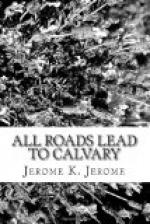She had forgotten the time. It was already late afternoon. Her long walk and the keen air had made her hungry. She had a couple of eggs with her tea at a village inn, and was fortunate enough to catch a train that brought her back in time for dinner. A little ashamed of her unresponsiveness the night before, she laid herself out to be sympathetic to her father’s talk. She insisted on hearing again all that he and Arthur were doing, opposing him here and there with criticism just sufficient to stimulate him; careful in the end to let him convince her.
These small hypocrisies were new to her. She hoped she was not damaging her character. But it was good, watching him slyly from under drawn-down lids, to see the flash of triumph that would come into his tired eyes in answer to her half-protesting: “Yes, I see your point, I hadn’t thought of that,” her half reluctant admission that “perhaps” he was right, there; that “perhaps” she was wrong. It was delightful to see him young again, eager, boyishly pleased with himself. It seemed there was a joy she had not dreamed of in yielding victory as well as in gaining it. A new tenderness was growing up in her. How considerate, how patient, how self-forgetful he had always been. She wanted to mother him. To take him in her arms and croon over him, hushing away remembrance of the old sad days.
Folk’s words came back to her: “And poor Jack Allway. Tell him I thank him for all those years of love and gentleness.” She gave him the message.
Folk had been right. He was not offended. “Dear old chap,” he said. “That was kind of him. He was always generous.”
He was silent for a while, with a quiet look on his face.
“Give him our love,” he said. “Tell him we came together, at the end.”
It was on her tongue to ask him, as so often she had meant to do of late, what had been the cause of her mother’s illness—if illness it was: what it was that had happened to change both their lives. But always something had stopped her—something ever present, ever watchful, that seemed to shape itself out of the air, bending towards her with its finger on its lips.
She stayed over the week-end; and on the Saturday, at her suggestion, they took a long excursion into the country. It was the first time she had ever asked him to take her out. He came down to breakfast in a new suit, and was quite excited. In the car his hand had sought hers shyly, and, feeling her responsive pressure, he had continued to hold it; and they had sat for a long time in silence. She decided not to tell him about Phillips, just yet. He knew of him only from the Tory newspapers and would form a wrong idea. She would bring them together and leave Phillips to make his own way. He would like Phillips when he knew him, she felt sure. He, too, was a people’s man. The torch passed down to him from his old Ironside ancestors, it still glowed. More than once she




